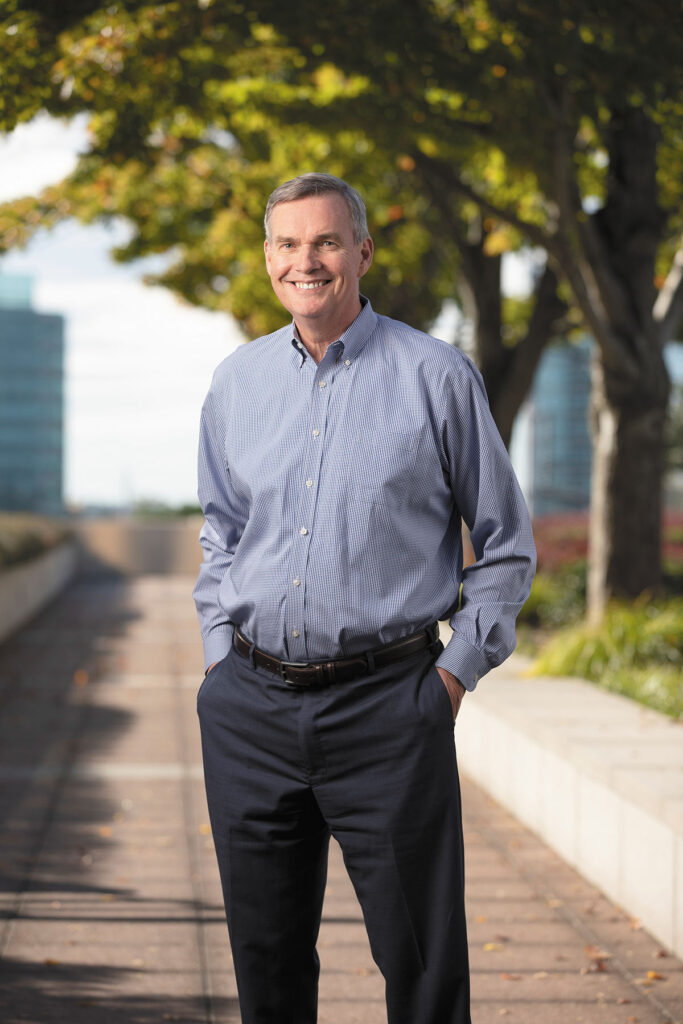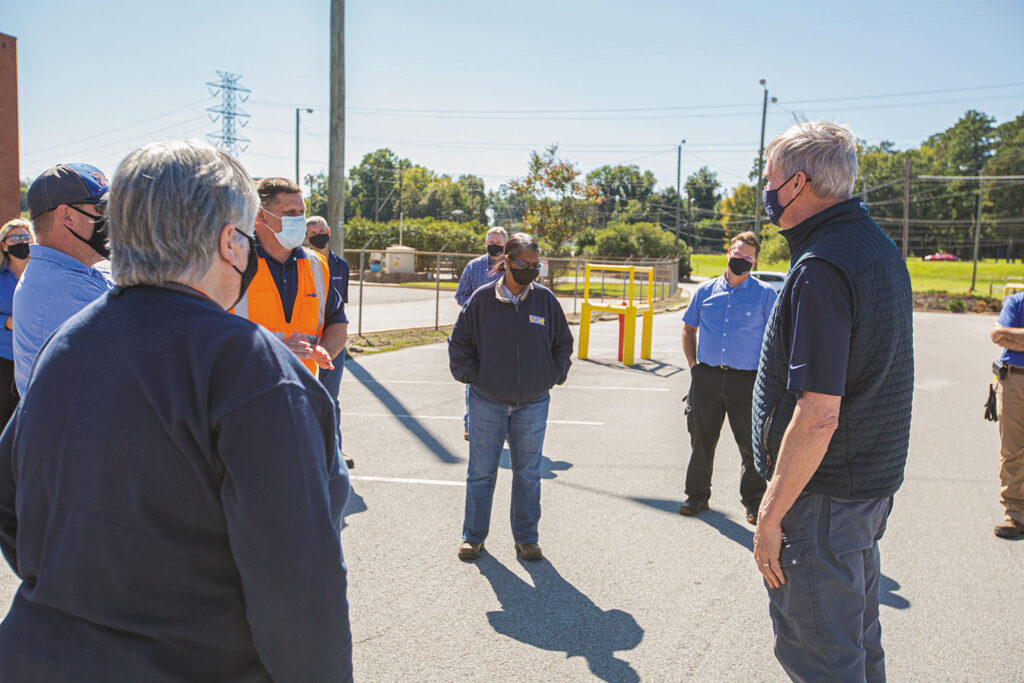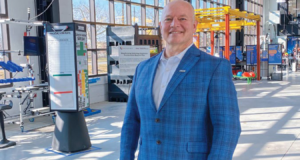With roots that go more than 100 years deep, WestRock is a world-leading global manufacturer of paper and packaging with more than 320 manufacturing facilities, design centers, research labs, and sales offices across the globe. CEO Steve Voorhees came onboard with the deal that built the company in 2015: the merger between RockTenn, where Voorhees previously served as CEO; and MeadWestvaco Corp., helmed at the time by John Luke. Both Rock-Tenn and MeadWestvaco were themselves legacy companies with more than a century of mergers, acquisitions, and reinvention.

Considering its dynamic history, it’s no surprise that WestRock has kept growing. Under Voorhees, the company has completed several major acquisitions, including the US$2.28 billion buy of Multi Packaging Solutions (MPS) in 2017; as well as the spin-off of its specialty chemicals business, the sale of its dispensing business, and the sale of most of its land and development assets. In late 2018, WestRock acquired KapStone Paper and Packaging Corp.; the company expects to achieve about US$200 million in “synergies and performance improvements” from the deal by the end of FY 2021.
“Experience is a great teacher,” in Voorhees’ own words. His success as a leader through change is part of why he was named the TAPPI/PIMA Executive of the Year for 2020. Paper360° Editorial Director Jan Bottiglieri asked him to share his perspectives in this exclusive interview.
P360°: Congratulations on receiving the Executive of the Year honor—it’s well deserved! What does an award like this mean to you?
Voorhees: I look at it as a WestRock award—it’s recognition for what we’ve accomplished as a company. You may have seen that we celebrated our 5-year anniversary yesterday. It was pretty incredible to me; we put together a video with 10 teammates from around the world: India, China, Brazil, Mexico, the United States. It was fun for me to see the diversity of countries and cultures we have in our company. I look at it as a company recognition instead of a person recognition.
WestRock may be only five years old, but there’s a long history of change and growth that led up to its formation. Change management is an important skill for any leader, and your time at WestRock has really put that to the test. As CEO, how do you navigate those changes?
There’s no cookie-cutter playbook. The merger that we did five years ago was very significant from a change management standpoint, and for that we put a lot of effort into culture. And we didn’t define “culture” from the top down; we had a cultural anthropologist come work with us to get input from people across the company. There was a great amount of commonality in the values that people wanted to see, so we selected those values early, and communicate them often. For that particular merger, it was important that we did that.
People often refer to our values of integrity, respect, accountability, and excellence as being a very positive aspect of WestRock. That pays dividends as you add people to the company, whether by acquisition or by hiring on. You’ve got that common thread, which is more than a job or anything else; it’s the character of what you’d like to make work in the company.
Are there any other lessons that you’ve learned from these mergers, when you’re trying to build an evolved corporate culture bringing together diverse companies?
Experience is a great teacher—we should accumulate as much as we can. Every situation is different, so you can’t look at any one person, or any particular acquisition, as a template. The people who own the business and the customers of the acquisition have different viewpoints. Adhering to our common culture, and communicating that, is important.
What can leaders do to reinforce a positive, consistent corporate culture—especially after an acquisition?
It starts with recognizing the impact that the leader has. We’re going through COVID-19 now; the impact of leadership on dealing with this pandemic is really important. We have standards that we try to institute, and the implementation of those standards is really up to the leader. Right now (Ed. Note: this interview was conducted in July, 2020), certainly in the United States, there’s controversy about whether to wear a face covering or not. Almost always, if a leader of a plant is wearing a face covering, everyone is wearing a face covering. If the leader of the plant is not, then they’re not. That’s just a very explicit example of what any leader’s impact will be. People will look at what a leader is doing and choose most often to follow that example.

This applies to other things that are very important to a company—it would include safety and taking care of customers. If they see leaders doing it, you’ll have a much better chance of having the whole organization do it.
Every week I make a video at one of our operating locations, which has been incredibly helpful for me to stay in touch with our organization; I don’t think we’d ever done anything like this before COVID, and we have so many people working from home now. The videos have been effective in connecting us across the organization. We do everything we can to provide the support people need to be successful. We certainly try to promote a collaborative work environment. Since we formed WestRock, one of our taglines has been “Winning Together”—that communicates that we’re collaborative across the organization, rather than a series of individual contributors.
I like that; it feels like a position of strength to stress collaboration. Does that include customers, vendors…?
It does. The strength of our company is the differentiated product offerings we have. We’re the only company that can supply the broad range of paper-based packaging that we have—we can make folding cartons, corrugated, a lot of varieties of board for special uses—and the strength of our portfolio is a competitive advantage for us. For us to realize that advantage, we need to be able to work across the organization and integrate solutions. People from outside of WestRock sometimes call it “cross-selling.” Our biggest success for customers is when we can integrate the products into a single offering.
We recently got an award from a global auto manufacturer that is re-branding its parts distribution. We’re making the packaging for parts, so picture a folding carton that then must be aggregated into a shipping box. This particular customer is concerned about counterfeiting. We’re able to put an invisible mark on the package to help us identify whether the part is counterfeit or not, on behalf of the customer. With that integrated solution, we’re able to optimize the total offering for the customer. And we’re able to do that better than the customer can do for themselves, because we’re packaging experts.
Is there anything you’ve learned managing this pandemic crisis that will carry through for you?
COVID came on very quickly; it’s hard to imagine, because February seems like a long time ago. There were only 100 cases in the United States at the end of February. Now, in late July, there are more than 2.6 million cases in the US, and more than 10 million globally. (Ed. Note: At press time in October, there were more than 7.5 million US cases, with more than 35 million worldwide.) We’re still learning about the virus. We’ve been in crisis mode, meeting regularly with updates.
Our customers demand changes rapidly, and the issues just keep coming—for instance, the issues of systemic racism now in the news. As we talk about these learnings, we’re managing the business differently than we were.
Right now, most of the administrative people in our company are working from home, while our manufacturing team is focused on working safely as they provide essential packaging. The pace of communication is more rapid than it’s ever been, and the pace of decision-making is more rapid than it’s ever been. We’ll be able to learn from that and carry it through. We’ll come out of this a stronger, more nimble organization.
What do you see ahead for the industry in terms of product innovations or new markets?
Our products are very attractive for the future. Fiber-based paper and packaging has a significant and increasing role. We’ve seen that in recent months with e-commerce as the most visible example. Up until COVID, sustainability was probably the most significant interest for our customers. Many of our customers have put out very explicit goals to have their packaging be either recyclable, reusable, or compostable. That plays into the strength of our business. WestRock is one of the largest recyclers in the world. We use fiber from sustainable forests, we use recycled fiber in our products, and the industry is very well-positioned to catch the wave on sustainability.
In order to generate demand from sustainability, there’s got to be innovation, so we’re building our innovation capabilities to be able to meet those sustainability issues. This industry has a very strong future, I think, because our product actually is very much aligned with trends. That’s very different than it would have been 20, 30, 40 years ago. Today, our manufacturing processes are very technically advanced. We have been able to invest in technology to make things more efficient and more sustainable than they’ve ever been.
I agree—it’s an exciting time to be in our industry! What words of encouragement or advice might you give to younger professionals in our industry?
Participate and engage. Young professionals know a lot, so we need their brains engaged and their emotions engaged. The best way to do that is to participate.
One of my jobs at WestRock is to make sure that we create an environment where all voices are welcomed and heard. We come up with ideas all the time, and we need all the ideas we can generate; then you work together and collaborate, and all of a sudden you have new, great ideas that weren’t even on the table before.
I said before “leaders have an impact.” Well, young professionals can have a very significant impact on the way the leaders feel. It’s a two-way street. We need every voice in our company to be heard.
That’s interesting—most people don’t think of how they can affect their leader. What support does your team give you that helps you be an excellent leader?
First of all, I’ve got to be ready to accept advice. A very significant issue for us now has been systemic racism in society. I’ve spent a lot of time listening to our African American teammates. Over the past month, we’ve been able to have very significant, impactful conversations across our company. The events are impactful of themselves for me personally—just to hear the stories of our black population about what they’ve experienced, and the consistency of what they’ve experienced, in society. I’m learning an incredible amount.
WestRock has a lot of diverse people, all of which have their own perspectives. That’s a really important thing for our success, long-term: to have as many people engaged from as many backgrounds as possible. We’re going to be a better company as a result of it. And we need to work at it.
 Paper 360
Paper 360
